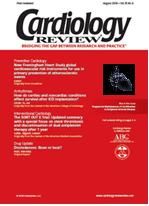High-dose statins and the high-risk vascular surgery patient
In a recently published prior paper, Dr Feringa and his colleagues called attention to the prevalence of postoperative cardiac abnormalities in patients undergoing noncardiac vascular surgery.
In a recently published prior paper, Dr Feringa and his colleagues called attention to the prevalence of postoperative cardiac abnormalities in patients undergoing noncardiac vascular surgery.1 Not surprisingly for this clinical population, they reported an incidence of 23% for unrecognized myocardial infarction and 28% myocardial ischemia in the postoperative period. The use of statins and beta blockers was associated with an improvement in survival. Diabetes and heart failure were both valuable predictors of myocardial damage. Welten and colleagues, from the same institution, added renal insufficiency as a third clinical predictor of short- and long-term outcomes in these patients and found similarly that the use of statins reduced mortality.2
This current paper
reports an apparent linear correlation between statin dose and degree of low-density lipoprotein reduction with improvement in cardiac outcome following what is described as "major vascular surgery." Although the authors warn about generalizing these results to include general or low-risk surgery, they may have unintentionally done just that within this patient population. As pointed out earlier in this publication,3 vascular surgical patients fall into several discrete operative categories. Those undergoing carotid endarterectomy or lower extremity bypass procedures (both "major" vascular surgical interventions) are not subject to the level of physiologic and cardiac stress that occurs in patients subjected to aortic surgery; the last of these groups is clearly at the highest intra-operative risk level for untoward cardiac events. It would be interesting if the authors had further stratified their patients into these 3 cohorts to see if they produce disparate results.
In our clinical practice of vascular surgery, a review of the past 5 years shows that an impressive 70% to 75% of our patients were already on statins prior to their surgery, suggesting that the medical community has embraced an active approach to cholesterol control and plaque stabilization in these high-risk patients. In terms of adequate preoperative preparation for a patient anticipating major vascular surgery, we have adopted the following approach regarding pharmacologic management, as recommended by Drs Daumiere and Fleisher in the anesthesia literature.4
If the patients are currently on beta blockers, the medications are continued; if not, they are initiated preoperatively. Statin dosage should also be maintained; if the patient has not been taking statins preoperatively, we recommend that they begin doing so with appropriate laboratory monitoring. The optimum duration of preoperative statin therapy is yet to be determined. This regimen will hopefully further reduce the peri- and postoperative morbidity and mortality in this population of high-risk surgical patients.
